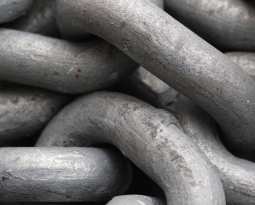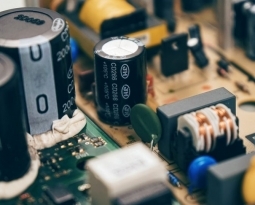Michigan Patent of the Month – June 2022
Germane (GeH4), in the context of chemistry, refers to a compound made of germanium and hydrogen. This colorless gas is heavier than air and very flammable. It is commonly used in the chemical vapor deposition (CVD) process used in semiconductor chip manufacturing.
The constant expansion of various devices and the growing demand for improved electrical performance requires the constant improvement of semiconductor chips. With this improvement comes increased complexity. As a result of this, there is a constantly growing demand for germanes. Ge Solartech, LLC has developed a method that promises the high-yield synthesis of higher germanes and higher silanes.
Higher germanes include digermane and trigermane. Similarly, higher silanes (SiH4) include disilane and trisilane. These higher versions are used throughout semiconductor chip manufacturing in a variety of applications including key technologies such as quantum cascade lasers, Si-based photonics, and high speed modulators.
The high-yield synthesis process is achieved using the hydrolysis of a germanium or silicon-containing alloy. The hydrolysis is promoted by an acidic substance like boron oxide or citric acid. Once a sufficient level of hydrolysis has been achieved, the higher germanes and silanes are dried out to prevent any further hydrolyzing. This process works sufficiently with a wide range of germanium-starting materials with a high yield product. This increases the available raw inputs while creating more end product in each round.
Ge Solartech is focused on the development of enabling technologies in the field of environmental protection and alternative energy. While germane is most commonly used in semiconductor manufacturing, it can also be used in thin film amorphous silicon solar cells.
Are you developing new technology for an existing application? Did you know your development work could be eligible for the R&D Tax Credit and you can receive up to 14% back on your expenses? Even if your development isn’t successful your work may still qualify for R&D credits (i.e. you don’t need to have a patent to qualify). To find out more, please contact a Swanson Reed R&D Specialist today or check out our free online eligibility test.
Who We Are:
Swanson Reed is one of the U.S.’ largest Specialist R&D tax advisory firms. We manage all facets of the R&D tax credit program, from claim preparation and audit compliance to claim disputes.
Swanson Reed regularly hosts free webinars and provides free IRS CE and CPE credits for CPAs. For more information please visit us at www.swansonreed.com/webinars or contact your usual Swanson Reed representative.

















